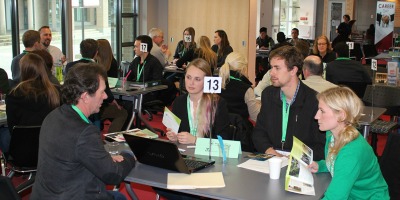
April 11, 2014, Vancouver — From increasing the durability of sports
fields and buildings, to mitigating the effects of climate change: when
it comes to sustaining cities and life within them, several local
experts agree that succeeding will in part fall to those with
backgrounds in horticulture.
April 11, 2014, Vancouver — From increasing the durability of sports fields and buildings, to mitigating the effects of climate change: when it comes to sustaining cities and life within them, several local experts agree that succeeding will in part fall to those with backgrounds in horticulture.
Kwantlen Polytechnic University’s (KPU) school of horticulture recently hosted an industry discussion, inviting local professionals to weigh in on the role horticulture will play in planning for the future.
 |
| Students, employers and industry experts gathered at KPU Langley for discussion about careers in horticulture, both at present and in the future. |
Held at KPU Langley, this year’s “Branching Out” conference focused on the theme: “Building resilient cities with limited water supplies. What our population is doing and new careers that we need to do to address resiliency issues.”
RESPONDING TO SUSTAINABILITY TRENDS
Panel speakers shared their ideas as to what new jobs might look like in order to address the sustainability needs of the future.
Owen Croy, director of Surrey parks and recreation, outlined the municipality’s mission to make sports fields durable, environmentally sustainable and financially profitable.
Given that Surrey uses 3.4-million litres of water per day on its 90 sports fields during the summer, Croy suggested that parks managers in the near future will have to be adept at managing bio-swales and porous cement to mitigate stormwater run-off.
He also thinks they will be more considerate of a probable return to artificial turf laid on soil-based media, rather than the current water-thirsty sand-based fields.
PLANTING TREES TO REDUCE HEAT ISLAND EFFECT
Equally as important, Croy says parks and recreation managers will be all too conscious of planting trees to reduce the “heat-island” effect common in urban environments – a mindset that means skilled horticulturists able to select the correct trees for specific applications will be in demand in areas that are warmer than their surrounding areas due to increased human activity (the heat island effect).
Judith Cowan, planner with the City of Richmond and KPU alumna, turned her attention to the need for future landscape architects and urban planners to apply their skills and knowledge to issues like rising sea levels. She also emphasized the need to develop long-term resilience to climate change.
From the private sector, Ron Schwenger of Architek – a “living architecture” technologies firm – discussed the need for future urban horticulturists to be able to deal with extremes of water quantity, quality and availability to cities in changing climates.
GREEN ROOF OPPORTUNITIES
He added that the benefits of “green roofs” will be critically important to urban dwellers to manage rooftop membrane longevity, heat island effects and energy demands.
Combined with solar panel installations and associated green roof technology, living walls and green façades are rapidly beautifying cities and providing the ultimate selection in local food options. Some even go as far as providing a space for rice production in cities in Japan.
Given such novel opportunities, Schwenger says tomorrow’s urban horticulturists will need to be adaptable and ready to face unforeseen challenges.
The event’s final panel speaker was Geoff Bradley, local inspector with the Canadian Food Inspection Agency.
He addressed how with climate change comes the potential for new and invasive (non-indigenous) pests and diseases.
Increased traffic in imported produce and agriculture-based goods, combined with ecosystem change, will mean those responsible for plant protection in the future will be dealing with an ever-increasing range of unfamiliar organisms, and will need to be adept at problem-solving and communication.
GUERRILLA GARDENING EXPERTISE
Keynote speaker for the event was Vancouver community gardener and activist David Tracey, author of the best-selling book Guerrilla Gardening: A Manualfesto and Urban Agriculture.
He brought together the ideas of all the panel speakers, stressing the need for future horticultural leaders to be technically at the top of their game, and to be innovative and adaptable in the face of challenges that may not yet exist.
While a huge hurdle, Tracey says this also represents a massive opportunity for those working in the sustainable development of urban environments and local food systems.
The event combined presentations with an opportunity for students to have face-to-face ‘speed-dating’ sessions with nearly 30 potential employers. The event also allowed forward-thinking employers a chance to connect with soon-to-be qualified horticulture graduates.
For more information about KPU's school of horticulture, visit kpu.ca/hort or contact triona.king@kpu.ca.
Print this page